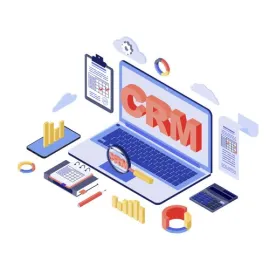When you don't have a CRM, it's easy for client information to get lost in the shuffle. Paper files can be misfiled or misplaced, and essential emails can slip through the cracks, leading to frustration as your team scrambles to track down the necessary information.
A CRM, or customer relationship management system, is a software program that helps businesses manage customer interactions. A CRM for law firms can help avoid these frustrating situations by keeping your client information in one central location. Your team can always find what they need when they need it.
Why is Law Firm CRM Software Necessary?
At its most basic, a CRM for law firms is a tool to help you manage your interactions with potential clients. But a good CRM does much more than that. It can help you automate client engagement, streamline your intake process, and keep your client data up to date.
Software for client relationship management (CRM) enables attorneys to manage business development activities, including the client intake process, track tasks, and deadlines, and remind users of upcoming appointments. In addition, a CRM system can help generate reports which can be used to track progress and identify areas for improvement.
Read more about CRMs:
Does the Size of a Law Firm Matter When Considering a CRM?
Ultimately, CRMs can benefit businesses of all sizes thanks to their ability to streamline operations and improve efficiency.
-
For solo practitioners, CRMs can help manage and scale their law practice efficiently.
-
For small law firms, CRMs can eliminate the busy work that keeps them from focusing on billable work and can help small firms scale their practice with a tech-driven approach.
-
For midsize to large firms, CRMs can deliver consistent, high-quality legal services at every step of the client journey while streamlining operations to accelerate growth.
What Area of Law Needs a CRM?
In today's world, a CRM can benefit nearly any area of law.
-
For estate planning, a CRM can help to elevate the client experience by keeping track of important details and deadlines.
-
In family law, a CRM can help attorneys handle sensitive matters efficiently, tactfully, and with the organization.
-
Personal injury lawyers can use a CRM to schedule appointments and stay on top of the necessary details of each matter.
-
Criminal defense lawyers can use it to give every client the representation they deserve.
-
And for immigration lawyers, a CRM can help to build trust with clients and automate tedious administrative tasks.
No matter what area of law you practice, a CRM can help you to work more effectively and serve your clients better.
What are the Types of CRMs?
There are four main types of CRMs: analytical, collaborative, operational, and strategic.
-
Analytical CRMs focus on collecting and analyzing customer data to improve business performance.
-
Collaborative CRMs help businesses improve communication and collaboration with customers.
-
Operational CRMs automate and streamline business processes.
-
Strategic CRMs help firms develop long-term plans for managing customer relationships.
Want to learn which type of CRM is best for your law firm? Read more:
Top 3 Features for Law Firms
When it comes to running a successful law firm, there are a lot of moving parts. From keeping track of client communications to managing your pipeline, there's a lot to stay on top of. A good CRM can help you manage the numerous moving parts of your law firm, making it easier to run a successful business.
-
Legal contact management will help you keep track of your clients in one central place so your team stays organized and up-to-date.
-
Pipeline management tools can help you focus on prospective clients quickly, making the follow-up process more efficient.
-
Automating client engagement means you never drop the ball on lead follow-up and consistently provide value to your clients.
How to Evaluate the Best CRM for Law Firm
With so many CRMs on the market, how should you choose the best one for your firm? Perhaps the most important factor to consider is whether the CRM will actually help you generate more business. After all, what good is a CRM if it doesn’t help you bring in more clients? To that end, you should look for a CRM that has features specifically designed to help law firms market themselves more effectively.
Another important consideration is the ease of use. We're not saying you aren't tech-savvy, but it's universally acknowledged that many lawyers are not particularly tech-savvy, so it’s essential to choose a CRM that is easy to implement and use daily. So look for a user-friendly CRM with a responsive client support team that offers training. Enabling even the most technophobic lawyer to get up and running quickly and easily.
Finally, you should consider whether the CRM will simplify your technology stack or add another piece of software to an already complex setup. If you’re already using a case management system and an accounting system, for example, you’ll want to make sure that the CRM you choose integrates seamlessly with both of those systems.
Continue the Conversation with Lawmatics
A CRM is a must for any law firm looking to manage and improve its business. At the very least, every law firm should use CRM software to keep track of client information, communications, and case history.
However, not all CRMs are created equal. There are many different features available in various CRMs, so you must find one that fits the specific needs of your law firm.



 />i
/>i

